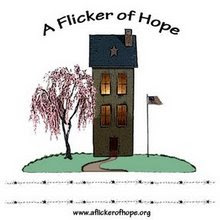In the midst of my blog-surfin', I came across The Reeds in Liberia. It is the blog of a missionary family living in Liberia. I'm really enjoying reading their perspective of life where "Whombie" lives.
Recently, there was a post on Liberian English. It cracked me up to read this post. It may be considered English, but it seems like I would need a foreign language course to be able to speak it.
Take a look and see how you would do:
(From "The Reeds In Liberia" Oct. 1, 2007)
Liberia is classified as an “Anglophone” country. Despite its 15 active tribal languages, the official language of the country is English. This makes it easier for us to work here, obviously because we did not have to learn a completely new language upon arrival. I said it makes it easier, but understanding the Liberian version of English is not always easy, and even after two years sometimes it is impossible. Being the amateur linguist that I am, I’ve been able figure out what is behind this difficulty in understanding my native tongue when uttered by many Liberians. It is not simply a matter of accent.
First, and most obvious to the listener, is in the way Liberians pronounce many words—the end of many words are left off. “House” becomes “haw”, “dog” becomes “daw”, “serious” becomes “seria”, and so on. Sometimes even each syllable in multi syllable words are deleted, so “redlight” might become “re’li’”, “everything” is “e’ry’tin’, or ” kool aid” is “koo aye.”
To complicate matters significantly, Liberians use different English words than most North Americans choose. For example, “reaching” means “leaving” as in “I’m reaching to my hou’,” “finish” means “to be out of something,” As in “the rice is finish,” or “flog” instead of “beat,” as in “My brother tol’ me he wou’ flog me.” Finally, Liberians finish many words randomly in “O,” as in “fini-o” for “finish,” or “daw-o” to give “dog” a little more panache.
Therefore when you combine words pronounced differently with word choices that are different than what you’ve lived with all your life, you get sentences that are just a little beyond reach until you understand both the usage of the word and the pronunciation of all the words in the sentence.
So, putting these factors together, we might have the following sentences—see if you can figure them out:
1. “Trokon carry mah own sef pla’ toe to hi’ hou’.’” (Literally, “Trokon carry my own self play toy to his house,” or “Trokon took my toy to his house.”)
2. “Dea’ ca’ be sweeo.” (Literally,” Deer can be sweet-o,” or “Venison is delicious.” )
3. Leh ca’ta’ eh sleepi’ bah da’ pi’ hou’ (Literally, “the carter it sleeping by the pig house” or “The carter (a clothe pad used to cushion the head when carry things) was left out all night near the pig pen.”)
4. “De ro’ he wah a bri’ one and dryo.” (Literally, “The rogue he was a bright one and dry-o,” or “The thief was light-skinned and very thin.”)
5. “Leh pum’ eh spoi’. Le’ carry de jeep to tow’ fo’ new pah.’” (Literally, “The pump is spoiled, let’s carry the jeep to town for new part,” or “The pump is not working, so let’s take the 4wd vehicle into town for a new part.”)
6. “Boieh! Boieh! Boieh!” (Literally, “Boiled egg, boiled egg, boiled egg!” which children shout as they carry hard boiled eggs for sale on the street.)
7. “Unca Bah, I juke mah foo-o. Plea’ pu’ plasti’ on mah cuh.” (Literally, “Uncle Bob, I juke my foot. Please put plastic on my cut,” or “Uncle Bob, something jabbed or poked into my foot. Please put a band aid on my cut.”)
8. “Eneh, i’ yaw wais’ wateh on ma’ trouseh, I weh sureleh blow yaw mouf.” (Literally, “Enoch, if you waste water on my trousers, I will surely blow your mouth, “ or “Enoch, if you dump or spill that water on my pants, I will certainly punch you in the mouth.”)
9. Deh worsha’ weh fi’fi’. We gettin’ yaw puh-lenti!” (Literally, “The worshop was fine, fine. We getting you plenty,” Or “The workshop was very good. We understood you very well.”)
10. “Whi’ ma’, plea’ buy suh’ re’ oi’ fruh me. One hundreh LD.” (Literally, White Man, please buy some red oil from me. One hundred LD.” Red oil is palm nut oil; LD is Liberian Dollars—in this case about $1.80 US. )
11. “Sis Renita, I cuh’ to spe’ to yaw.” (Literally, Sis Renita, I come to speak to you,” or “Sister, Renita, I dropped by just to say hi.”) Not everybody speaks like this, but these phrases reflect a large portion of the people with whom we live and work each day. Some people, such as government or business leaders speak very similar English to me, with only what I call the attractive “African accent” distinguishing us.
Others speak a version of English so different in cadence, inflection, pronunciation, syntax and vocabulary as to require interpretation. Most children are harder to understand than adults. In our neighborhood, English is a second language to Bassa for many, and a significant minority speak virtually no English. So getting to understanding each other always takes a little extra time, even for simple things. Bu’, we ah tryin’, sma’ sma’, wid dis talkin’ ting he’. An’ soo’, we wi’sureleh be gettin’ e’rybodeh puh-lenty clea’, an den’ we ha’ a googoo ti’ togeddeh.
Monday, October 29, 2007
Subscribe to:
Post Comments (Atom)



No comments:
Post a Comment